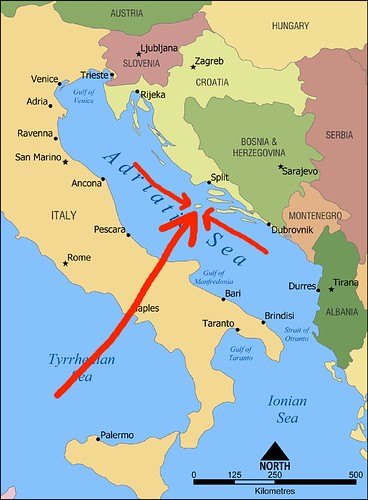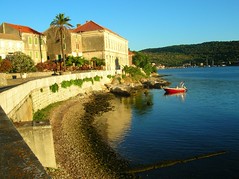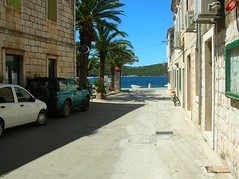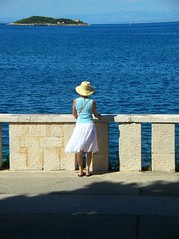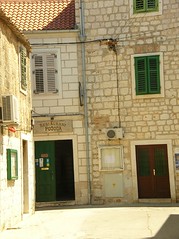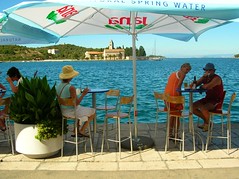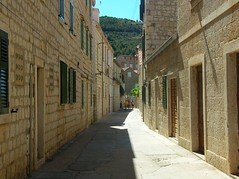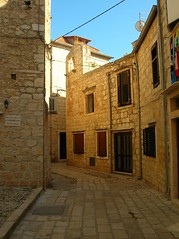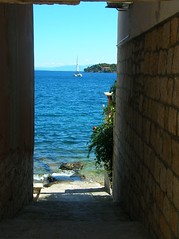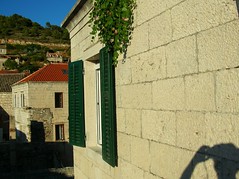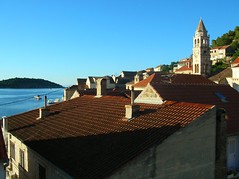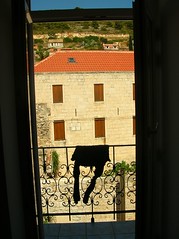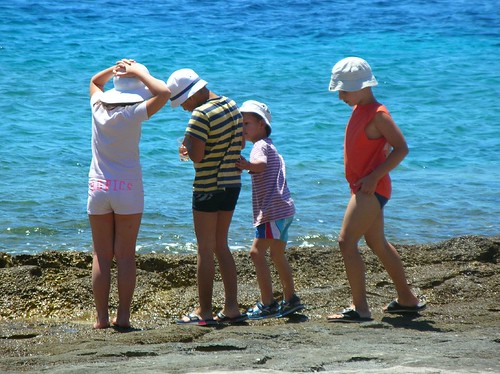Thursday, July 19, 2007
Vis
We returned from Vis 10 days ago, so I'm catching up on a blogging backlog by posting about it now.
Vis was dreamy ... just what I wanted a Mediterranean island to be. Three days of swimming off of rocks and tiny beaches in unworldly blue water that is so bouyantly salty you can float without effort. Lying in the sun. Eating meals with lots of fish and olive oil (okay, and goat swimming in an inch of clear fat) at restaurants where the waiter brings you a platter of raw, whole fish and you discuss with him which one you'll have cooked up, as he picks each up in turn and brandishes it at you, estimating its weight.
The small seaside town with narrow cobbled streets, old stone buildings with terra-cotta roofs and heavy wooden shutters. The sun so hot that everything shuts down in midday and you have no choice but to take a siesta, keeping your shutters just a bit ajar to let in a glimmer of sunlight and cool sea breezes.
And vivid, unforgettable colors -- especially the range of blues -- that these photos just don't capture.
The egg-shaped island of Vis has a town at each end and a few villages dotting the rugged inland parts. Its overall population is a few thousand, and far less than it was in earlier centuries.
The local inhabitants are very ambivalent about tourists. The town of Vis has only two hotels, the popular swimming areas are commercial under-exploited, and there is not a single sign pointing you to hillside cavern where Tito hid with his partisans for several months in 1943. On the other hand, though the nearby Croation island of Hvar, which has emerged as the chic alternative to the Greek islands, siphons off the majority of tourists, Vis gets its share. The waterfront is lined with restaurants and the jetty crammed with tourist's sailboats most of the week. The same babel of languages one hears in Split can be heard in Vis.
There is something vaguely unsettling about being a tourist there. Many Croatians seem to speak good English, but they seem begrudging about your presence there -- similar to my impression of the Poles. Is it a Slavic thing? A post-communism first-world/ second-world thing?
Or is it the fact that they only recently faught a bloody civil war? Miloje, our Serbian host, has been comfortable going to Vis only for the last three years and some of here family will not set foot there. In the last hundred years, the Balkans have seen more war, and more recently, than any other part of Europe, and contemporary Croatian nationalism openly harkens back to the Ustazi faction that in its day had sought an alliance with the Nazis.
I would not return there without having friends to visit, yet I am so glad I went.
Vis was dreamy ... just what I wanted a Mediterranean island to be. Three days of swimming off of rocks and tiny beaches in unworldly blue water that is so bouyantly salty you can float without effort. Lying in the sun. Eating meals with lots of fish and olive oil (okay, and goat swimming in an inch of clear fat) at restaurants where the waiter brings you a platter of raw, whole fish and you discuss with him which one you'll have cooked up, as he picks each up in turn and brandishes it at you, estimating its weight.
The small seaside town with narrow cobbled streets, old stone buildings with terra-cotta roofs and heavy wooden shutters. The sun so hot that everything shuts down in midday and you have no choice but to take a siesta, keeping your shutters just a bit ajar to let in a glimmer of sunlight and cool sea breezes.
And vivid, unforgettable colors -- especially the range of blues -- that these photos just don't capture.
The egg-shaped island of Vis has a town at each end and a few villages dotting the rugged inland parts. Its overall population is a few thousand, and far less than it was in earlier centuries.
The local inhabitants are very ambivalent about tourists. The town of Vis has only two hotels, the popular swimming areas are commercial under-exploited, and there is not a single sign pointing you to hillside cavern where Tito hid with his partisans for several months in 1943. On the other hand, though the nearby Croation island of Hvar, which has emerged as the chic alternative to the Greek islands, siphons off the majority of tourists, Vis gets its share. The waterfront is lined with restaurants and the jetty crammed with tourist's sailboats most of the week. The same babel of languages one hears in Split can be heard in Vis.
Above and below: Our hotel room windows and views from them.
There is something vaguely unsettling about being a tourist there. Many Croatians seem to speak good English, but they seem begrudging about your presence there -- similar to my impression of the Poles. Is it a Slavic thing? A post-communism first-world/ second-world thing?
Or is it the fact that they only recently faught a bloody civil war? Miloje, our Serbian host, has been comfortable going to Vis only for the last three years and some of here family will not set foot there. In the last hundred years, the Balkans have seen more war, and more recently, than any other part of Europe, and contemporary Croatian nationalism openly harkens back to the Ustazi faction that in its day had sought an alliance with the Nazis.
I would not return there without having friends to visit, yet I am so glad I went.
Subscribe to Comments [Atom]
